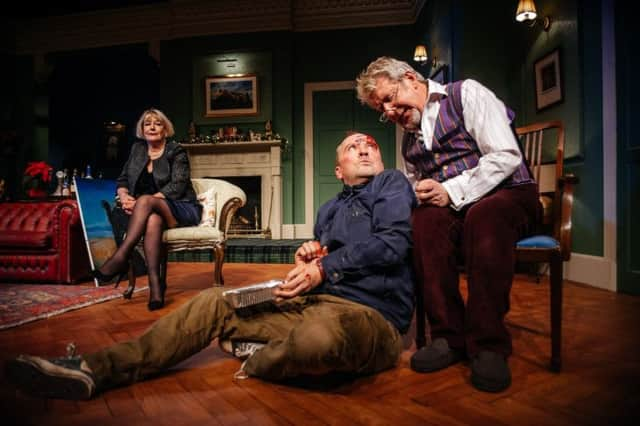Theatre review: The Devil Masters, Edinburgh


The Devil Masters
Traverse Theatre, Edinburgh
***
Iain Finlay Macleod’s The Devil Masters – playing until Christmas Eve, as a welcome alternative to the panto season – is not the most distinguished Edinburgh play ever seen at the Traverse; it’s not Trainspotting, nor David Greig’s The Architect, nor even David Anderson QC, the Traverse’s famous 1980s effort to examine sexual scandal in the Scottish legal system.
Yet for those in an indulgent pre-Christmas mood, it offers plenty of laughs, and some food for thought, although audiences may well emerge, after a brief hour and 40 minutes including interval, wondering whether they’ve seen a comedy, a tragedy or a very bad melodrama.
Advertisement
Hide AdThe action takes place in the beautiful New Town flat of the Leishmans, a wealthy pair of middle-aged advocates who have no children, dote on their dog Max, and are about to spend Christmas Eve exchanging their presents.
Their spacious drawing-room is beautifully realised on the big Traverse stage, down to the last twinkling light on the tree; John Bett and Barbara Rafferty are in fine form as the Leishmans. And when Keith Fleming enters in jeans and woolly hat as John, a delivery-man turned dog-kidnapper and thief, the scene seems set for some darkly insightful social comedy.
And up to a point, that is what ensues, as the days between Christmas and New Year pass in an increasingly ugly power-struggle between the Leishmans, John, and his unseen friends, a pack of dog-like urban marauders who trash the flat between scenes.
The play’s problem, in the end, lies in some confusion of tone – Danny Krass’s music signals the occasional uneasy slide towards near-hallucinatory violence – and an underlying failure of focus, betrayed by some oddly leaden comic lines.
It’s about humans as animals, about the fierce reactionary attitudes of the Edinburgh establishment, about the violence that underpins society and its laws, and about the strangely stereotyped idea that you can take the girl out of Glasgow, but you can’t really take Glasgow out of the girl.
Keith Fleming turns in a finely-nuanced performance as John, whose story turns out to be more complex than the “radge” image suggests.
Advertisement
Hide AdIt’s never quite clear, though, just how serious this play is about the caricature of Edinburgh upper-middle-class manners it presents. You could take it as a joke, or as a frighteningly dark political allegory, but it needs to clarify its mood, and sharpen its thinking, if it’s ever to achieve its full dramatic impact.
Seen on 10.12.14